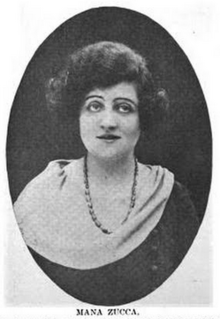Mana-Zucca

Mana-Zucca (25 December 1885 – 8 March 1981) was an American actress, singer, pianist and composer.
Biography
Mana-Zucca was born Gizella Zuccamanof (later changed to Zuccaman) in New York City on December 25, 1885. The daughter of Polish émigrés, she was a child prodigy who began composing at an early age. At the age of seven she began to study piano with the eminent Polish pianist and pedagogue Alexander Lambert, who taught at the New York College of Music. Lambert was not only her teacher but also her concert manager and mentor. Her practice regime, dictated by Lambert, was rigorous. So that he could make sure she kept to her schedule, Mana-Zucca lived with Lambert all the while that her career as a child prodigy flourished. The two remained very close friends throughout his lifetime. Lambert suggested that she take the stage name of Augusta, which she used for a while but did not like and later dropped in favor of Mana-Zucca, a rearrangement of her surname.
At the same time that Mana-Zucca studied piano with Lambert, she also studied harmony and composition with Herman Spielter. Her first published work, Moment Musicale, for violin and piano, was composed when she was only seven years old. Her Etude de Concert was written when she was eight. Her first art song, Frage, was published by Rudolph Schirmer, as were Moment Triste and Moment Orientale, both composed when she was nine, followed by a large number of other works composed in her lifetime.
At the age of eight, she performed as piano soloist in the Beethoven Piano Concerto No. 1 with the New York Symphony Orchestra. In 1914 she made her stage debut with a soprano role in Franz Lehár's The Count of Luxembourg. She studied piano under Ferruccio Busoni, Leopold Godowsky and Alexander Lambert, and composition under Hermann Spielter.[1]
As Mana-Zucca approached her early teens, she sailed to Europe with her elder sister Beatrice, better known as Bess. They settled in Berlin, Germany, and she soon became part of that city's busy and exciting cultural milieu. Mana-Zucca's debut in Berlin, at the Bechstein Saal, was highly acclaimed and opened doors for other engagements throughout Europe. Given the opportunity to play with famous Spanish violinist Juan Manon, she performed with him in several successful concerts before signing a contract to play sixty concerts with him over a three-year period; they appeared together throughout Germany and Russia.
While in Berlin, Mana-Zucca studied the works of Brahms with the eminent pedagogue Josef Weiss, and later she was accepted for study in the master classes of the great Ferruccio Busoni, which she attended for eight months. She received private instruction from Leopold Godowsky and also attended master classes that he conducted for selected students. In addition, while in Berlin she studied voice with a Fraulein van Gelder, and later, in London, she studied with Raimond von zur Muhlen, a famous singer of lieder and a much-sought-after voice teacher.
A new phase in Mana-Zucca's life began when she accepted the marriage proposal of Irwin M. Cassel, a gentleman she had known since her youth. The couple eloped on 21 September 1921. Cassel promised his new wife that they would spend seven months of each year in New York City and the remaining five months in Miami, Florida, where he made his home. Cassel supported Mana-Zucca's musical career and even wrote the lyrics to the now-famous song "I Love Life" (1923), which has been performed by celebrated singers such as John Charles Thomas and Lawrence Tibbett. Ultimately, and especially after the birth of her only child, a son, in 1926, Miami became her permanent residence. She spent many happy hours there composing and presenting musicales in her home, "Mazica Hall." She died in Miami.
Mana-Zucca had three distinct but interconnected careers: as a concert pianist of great renown, as a singer who performed leading roles in musical comedy, and as a prolific composer. Her brochure of published music totals more than four hundred works. These include music for piano, orchestra, and voice. In addition, she also composed music for young students.
Mana-Zucca died in Miami on March 8, 1981. Her papers including copies of her compositions are housed at Florida International University.[2]
Works
Mana-Zucca composed over 1,000 works, including opera, orchestral works, ballet, chamber music and solo works, including a violin concerto for the American violinist Joan Field, but is best known through popular songs.[3]
References
- ^ Ammer, Christine (2001), Unsung: a history of women in American music, retrieved 11 November 2010
- ^ Mana Zucca, retrieved 29 August 2015
- ^ Mana-Zucca Cassel Dead at 89; Composed the Song "I Love Life", New York Times, 11 March 1981
- 1880s births
- 1981 deaths
- 20th-century American musicians
- 20th-century classical composers
- American classical composers
- American classical pianists
- American female classical composers
- American music educators
- American opera composers
- Jewish classical composers
- Jewish classical musicians
- Piano pedagogues
- Women classical pianists
- Female opera composers
